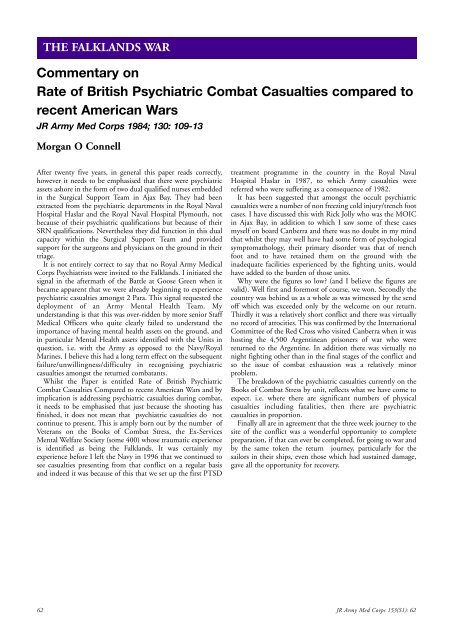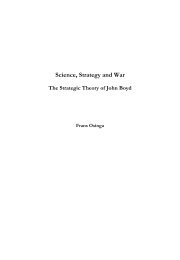Falklands war 25TH anniversarY - Boekje Pienter
Falklands war 25TH anniversarY - Boekje Pienter
Falklands war 25TH anniversarY - Boekje Pienter
Create successful ePaper yourself
Turn your PDF publications into a flip-book with our unique Google optimized e-Paper software.
THE FALKLANDS WAR<br />
Commentary on<br />
Rate of British Psychiatric Combat Casualties compared to<br />
recent American Wars<br />
JR Army Med Corps 1984; 130: 109-13<br />
Morgan O Connell<br />
After twenty five years, in general this paper reads correctly,<br />
however it needs to be emphasised that there were psychiatric<br />
assets ashore in the form of two dual qualified nurses embedded<br />
in the Surgical Support Team in Ajax Bay. They had been<br />
extracted from the psychiatric departments in the Royal Naval<br />
Hospital Haslar and the Royal Naval Hospital Plymouth, not<br />
because of their psychiatric qualifications but because of their<br />
SRN qualifications. Nevertheless they did function in this dual<br />
capacity within the Surgical Support Team and provided<br />
support for the surgeons and physicians on the ground in their<br />
triage.<br />
It is not entirely correct to say that no Royal Army Medical<br />
Corps Psychiatrists were invited to the <strong>Falklands</strong>. I initiated the<br />
signal in the aftermath of the Battle at Goose Green when it<br />
became apparent that we were already beginning to experience<br />
psychiatric casualties amongst 2 Para. This signal requested the<br />
deployment of an Army Mental Health Team. My<br />
understanding is that this was over-ridden by more senior Staff<br />
Medical Officers who quite clearly failed to understand the<br />
importance of having mental health assets on the ground, and<br />
in particular Mental Health assets identified with the Units in<br />
question, i.e. with the Army as opposed to the Navy/Royal<br />
Marines. I believe this had a long term effect on the subsequent<br />
failure/unwillingness/difficulty in recognising psychiatric<br />
casualties amongst the returned combatants.<br />
Whilst the Paper is entitled Rate of British Psychiatric<br />
Combat Casualties Compared to recent American Wars and by<br />
implication is addressing psychiatric casualties during combat,<br />
it needs to be emphasised that just because the shooting has<br />
finished, it does not mean that psychiatric casualties do not<br />
continue to present. This is amply born out by the number of<br />
Veterans on the Books of Combat Stress, the Ex-Services<br />
Mental Welfare Society (some 400) whose traumatic experience<br />
is identified as being the <strong>Falklands</strong>. It was certainly my<br />
experience before I left the Navy in 1996 that we continued to<br />
see casualties presenting from that conflict on a regular basis<br />
and indeed it was because of this that we set up the first PTSD<br />
treatment programme in the country in the Royal Naval<br />
Hospital Haslar in 1987, to which Army casualties were<br />
referred who were suffering as a consequence of 1982.<br />
It has been suggested that amongst the occult psychiatric<br />
casualties were a number of non freezing cold injury/trench foot<br />
cases. I have discussed this with Rick Jolly who was the MOIC<br />
in Ajax Bay, in addition to which I saw some of these cases<br />
myself on board Canberra and there was no doubt in my mind<br />
that whilst they may well have had some form of psychological<br />
symptomathology, their primary disorder was that of trench<br />
foot and to have retained them on the ground with the<br />
inadequate facilities experienced by the fighting units, would<br />
have added to the burden of those units.<br />
Why were the figures so low (and I believe the figures are<br />
valid). Well first and foremost of course, we won. Secondly the<br />
country was behind us as a whole as was witnessed by the send<br />
off which was exceeded only by the welcome on our return.<br />
Thirdly it was a relatively short conflict and there was virtually<br />
no record of atrocities. This was confirmed by the International<br />
Committee of the Red Cross who visited Canberra when it was<br />
hosting the 4,500 Argentinean prisoners of <strong>war</strong> who were<br />
returned to the Argentine. In addition there was virtually no<br />
night fighting other than in the final stages of the conflict and<br />
so the issue of combat exhaustion was a relatively minor<br />
problem.<br />
The breakdown of the psychiatric casualties currently on the<br />
Books of Combat Stress by unit, reflects what we have come to<br />
expect. i.e. where there are significant numbers of physical<br />
casualties including fatalities, then there are psychiatric<br />
casualties in proportion.<br />
Finally all are in agreement that the three week journey to the<br />
site of the conflict was a wonderful opportunity to complete<br />
preparation, if that can ever be completed, for going to <strong>war</strong> and<br />
by the same token the return journey, particularly for the<br />
sailors in their ships, even those which had sustained damage,<br />
gave all the opportunity for recovery.<br />
62 JR Army Med Corps 153(S1): 62

















